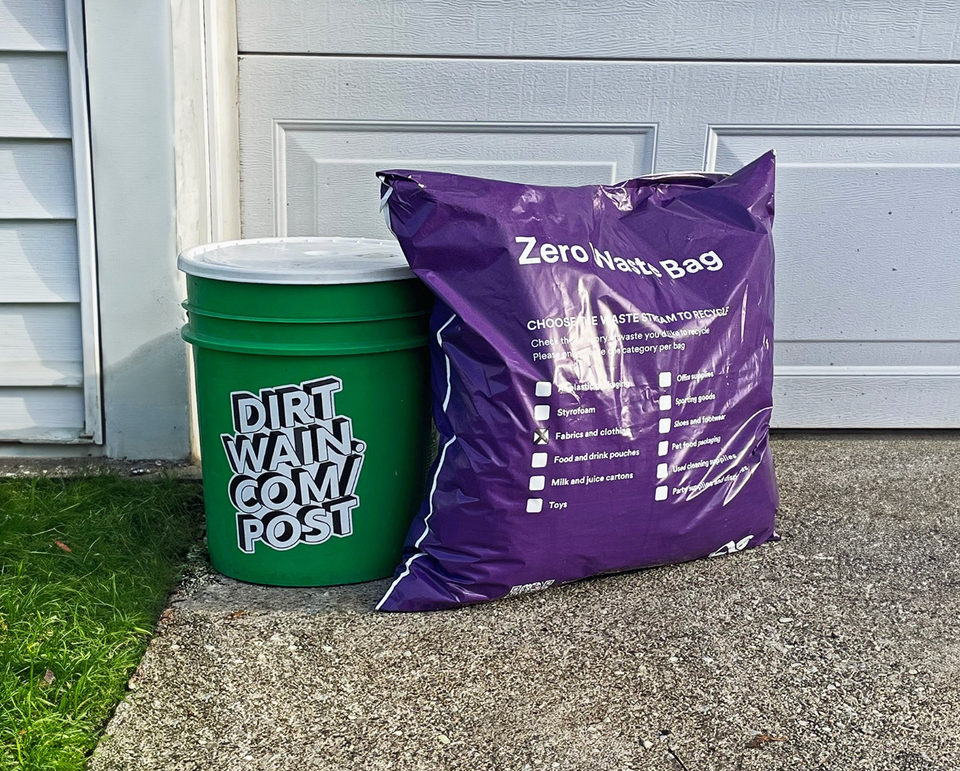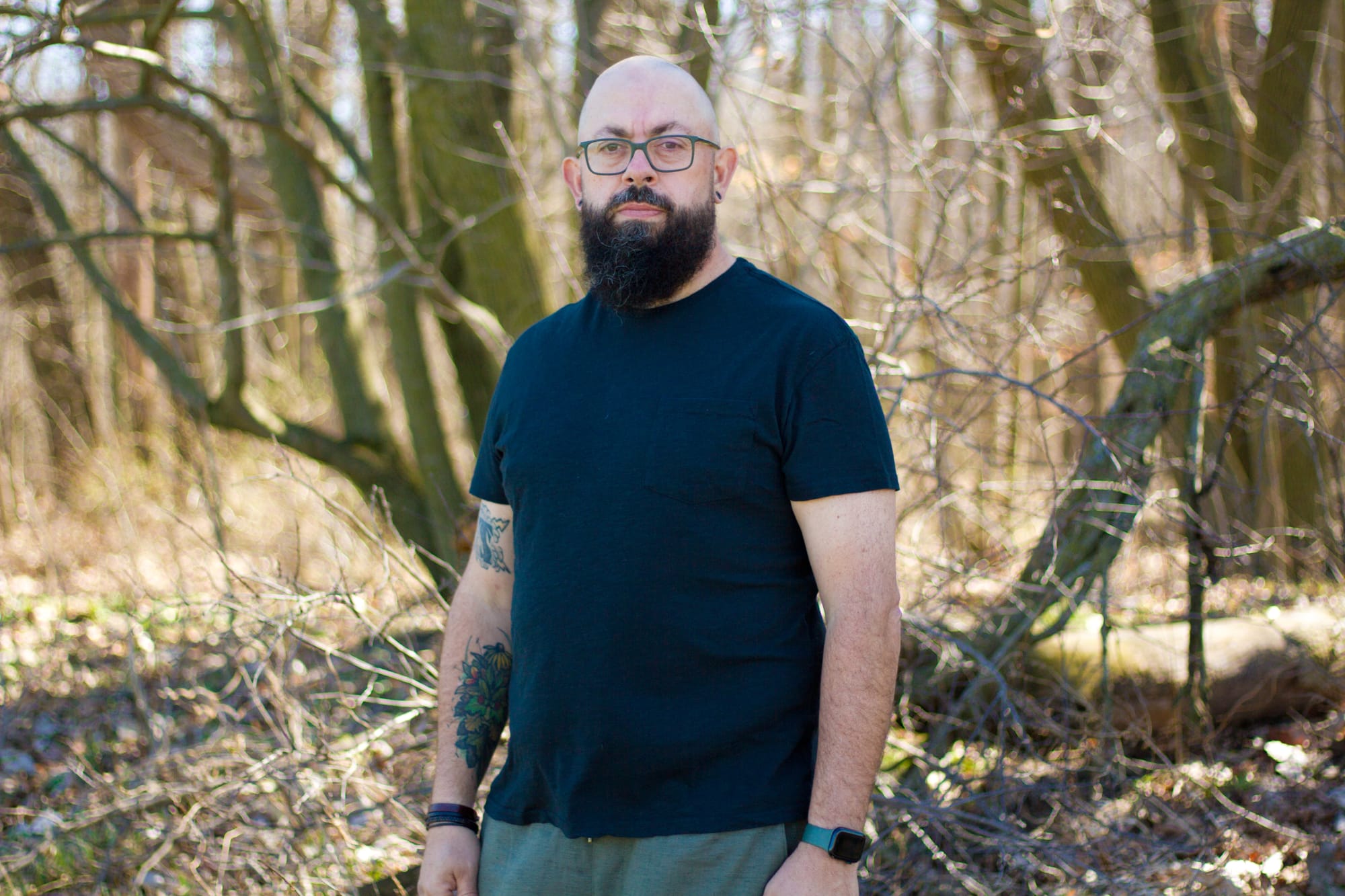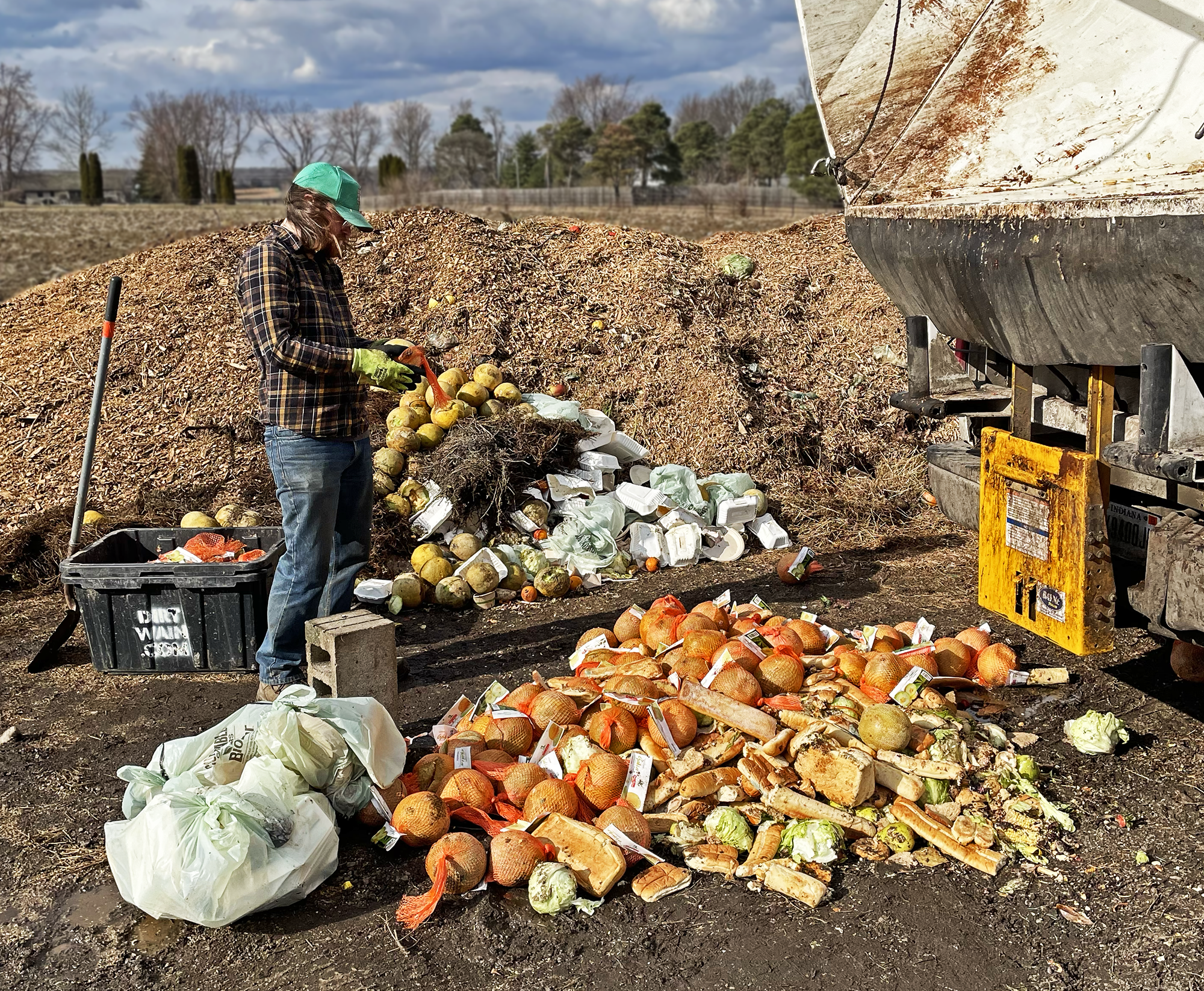What is 'real recycling'? Dirt Wain shares its latest ventures

While many people in Fort Wayne care about the environment, finding ways to improve what happens to our waste can feel like a daunting task.
Last year, we received a question from a reader about just how much of what we put into our recycling bins in Fort Wayne actually gets recycled. And what we learned is: while our recycling isn't technically going to the landfill, much of it is being downcycled when it could be upcycled in more sustainable – even profitable – ways.
Finding different and more eco-friendly methods of managing waste in Fort Wayne is one of the motivating factors behind Dirt Wain – the only local, large-scale composting company started by artist and educator Brett Bloom about five years ago.
With a lifelong interest in the environment and experience teaching abroad in one of the most sustainable cities in the world, Bloom returned to Indiana in 2019 with a desire to convert deeply ingrained waste streams here into circular economies.
Over the years, he and his team have carved out ways to compost food scraps, yard waste, and pet waste locally. And this year, they’re moving more into what they call “real recycling,” tackling some of the most difficult-to-recycle items with verified sustainable solutions.
In July, we're partnering with Dirt Wain to bring all paid subscribers to The Local one FREE month of Dirt Wain’s basic food scrap composting plan (a $21.50 value), so you can see for yourself what their service entails and just how simple composting can be.
We sat down with Bloom to learn more about Dirt Wain’s services and a few key sustainability issues on his mind in Indiana.

First, give us more background on you and what led you to start Dirt Wain.
BB: I’ve been environmentalist since I was a teenager, so I’ve cared about issues, like composting, for a long time. I actually started composting when I was a little kid with my grandparents before I had a name for it. We’d bury kitchen scraps in the garden to fertilize the soil, and that’s still an easy way to get started for many people, without having to purchase large equipment or rotating bins.
After I graduated from high school and college in Indiana in 1989, I went onto the University of Chicago for my graduate degree in fine arts, and I stayed in Chicago for about 13 years. For part of a year, I moved to Copenhagen, Denmark, which was a really amazing experience, and years later, my wife and I ended up back in Denmark when I got a contract to teach at a fine arts academy there.
Then in 2015, we moved to Fort Wayne with our two young children, and it was a difficult time politically to be returning to Indiana after living in some of the greenest countries in the world. I worked at Oak Farm Montessori School a number of years until the pandemic. Then I started Dirt Wain in 2019 with nothing but a homemade bike cart and a dream of making our region cleaner and healthier.
In the past five years, we’ve grown Dirt Wain to a team of five people, and we've come a long way from servicing just six households in one neighborhood. We now compost food scraps, yard waste, and pet waste in 10 municipalities across Northeast Indiana, and the journey has had many ups and downs and interesting challenges.
In Denmark, the work I do feels redundant — both as an artist and an environmentalist. But here, I feel that it’s so needed, and the people who support it really care. There are a lot of challenges involved in bringing composting services and “real recycling” to communities, but when the state does an enormous amount for you (as in Denmark), people can become passive, and that’s not good either.
Tell us more about the challenges you’ve faced in trying to bring composting and “real recycling” to Fort Wayne.
BB: The last three years have been brutal, to say the least. I calculated it once, and you basically have to come into this business with $100,000 worth of equipment and $30,000 worth of land and know what you’re doing with composting and waste services. There are all these supply streams and rules; it feels impossible to figure out.
While there’s a lot you can learn from other cities and states, each system operates its trash, recycling and composting facilities differently, so there are a lot of local nuances and technicalities to sort out, and of course, waste management systems are also beholden to powerful corporate interests, which makes it even more complicated.
But that’s part of the value we’re creating at Dirt Wain: we’re figuring out how to handle a lot of the headaches of composting for you, so it can be as simple as putting out your trash or recycling. And as we get more into what we call “real recycling,” we’re finding ways to ensure that the items you intend to recycle are treated sustainably and responsibly, which as you know, doesn’t often happen when you use your city-provided recycling bin.
How have you grown Dirt Wain so far?
BB: I piloted the program in the summer of 2019 in the 46805. Folks let us put bins in their backyards and park our bike cart at the corner of Garfield and Edgewater. Then I started composting at the (formerly combined) YLNI and Ft. Wayne’s farmers markets Downtown, and pretty quickly, representatives from Chick-fil-A in Fort Wayne saw us there and asked us to compost their food scraps. That immediately made the bike cart model impossible.
I was picking up Chick-fil-A’s compost about once a week, and it was a couple hundred pounds. At one point, they had 29 boxes of lemon rinds, and I didn’t have a compost truck for Dirt Wain yet, so I was loading boxes into my minivan with my kids complaining.
A few years ago, we asked for community donations to buy a composting truck, and many people pitched in. We still had to take out a loan, but it was worth it. The truck tripled the amount of work we could do in a day. We’d like to get another truck now, and we’ve got a lot of grants out that we’re hopeful about — some of which could change the trajectory of Dirt Wain, so stay tuned.

What do you consider some of your biggest accomplishments and milestones?
BB: So far, we’ve diverted hundreds of tons annually from the landfill. This year, we’re approaching 300-400 tons of food scraps composted, and we have more than 450 local households and businesses utilizing our services.
I’m really proud of our efforts to offer real recycling, too, where we’re partnering with an organization called TerraCycle to bring you a groundbreaking solution to some of the toughest recycling challenges. Through our website, you can order “Zero Waste Bags” for upcycling 24 categories of hard-to-recycle items that local recycling programs often leave behind, like toothpaste tubes, snack wrappers, and other common household goods. TerraCycles collects these and upcycles them into other products rather than sending them to the landfill.
I’ve personally saved a large 55-gallon bag of about five months’ worth of plastic packaging, which TerraCycle’s third-party verified operators are going to turn into playground equipment. The collection bags range in size and price (about $12-$27), so it’s not necessarily cheap, but it is a sustainable solution, and it’s something the city could choose to subsidize on a broader scale, if the interest was there.
What can be frustrating is: Fort Wayne and other cities could fund so many amazing waste management solutions and actually make money by upcycling goods and creating more sustainable systems, if the ideology of privatizing waste management wasn’t so pervasive in the U.S.
Landfill tipping fees in Allen County and Indiana are also among the lowest in the country, so it’s cheap to dump waste here, and it doesn’t incentivize municipalities to find more sustainable, long-term solutions.
What are a few sustainability issues that local people should know and care about, both good and challenging?
BB: Wood Farms, which is where our main composting site is currently located, is doing great work, and we partner with them. Along with the craft meat products they sell to restaurants and consumers, something you might not know about is they provide hay for a significant portion of organic farms from here to the East Coast. They basically make this cow kimchi, or fermented and nutrient-dense hay that’s sweeter for cows, and we compost the hay they can’t sell. So they have this beautiful, circular system where they fertilize their hay with the manure from the cows they raise for meat. Then they feed the cows the hay, and we help them close the loop by composting the hay as well as the meat scraps. Cattle and meat production are large sources of greenhouse gas globally, and the way Wood Farms operates sustainably is very impressive.
One local issue on my mind is definitely water use. Fort Wayne has spent $188 million to create the Deep Rock Tunnel (MaMaJo) to manage stormwater overflow when we could be taking alternative measures, like requiring water-saving features, like bioswales, in new developments or neighborhood renovations. We have ancient technologies that could be incorporated more often and beautify our city.
I also have concerns about the new Lightening Renewables (renewable energy) facility at Republic’s landfill in Fort Wayne. Republic Services also operates Fort Wayne’s recycling facility, and they could drastically increase the amount of material that can be upcycled locally by adding a roof to their facility (called a MRF), as they have done in other places. But they haven’t made that investment to improve our recycling stream here, which is discouraging.
One group in Indiana that gives me hope is Circular Indiana, which is focused on education and advocacy to strengthen Indiana’s circular economy. People there are working on some pretty significant issues and trying to shift waste management in the state. They’re taking corporate waste streams and repurposing them to boost the economy and make the state less polluted. It just goes to show: there are solutions out there, but it requires rethinking a lot of the systems we have in place and dislodging some really powerful global companies that are taking advantage of Indiana’s affordability and lax waste management regulations.
Tell us about the free deal for The Local's paid subscribers, and how it fits into Dirt Wain’s scope of services.
BB: One of the biggest barriers people have to composting is this fear that: “I’m going to do it wrong.” It can seem mysterious, too hard or too expensive. We hope that by offering one free month of our basic food scrap composting plan, people can try it and see if they like it and also see how easy it can be. In one month, you really see the difference in how much less trash you’re putting out, too.
When you sign up for our plan, we’ll deliver a green Dirt Wain bucket to your door and four compostable bags for food scraps (one for each week). We’ll come once a week to empty your bucket, and at the end of the month, you can choose to cancel with no obligations, if you aren’t satisfied. When you sign up, we’ll send you other details you need to know via email, including pickup times and a guide on what goes into your bucket. We try to make it as simple as possible to get started, and we’re available to answer questions along the way, too.
Last, but not least: What’s next for Dirt Wain in 2024 and the future?
BB: We’re working on a lot of cool projects, and I can’t share about all of them yet. But something we’re very happy about this year is our food truck partnership with Junk Ditch for its monthly “Debs at the Ditch” events. Our community has stepped up and donated enough silverware (and Junk Ditch purchased linens), so we can make these events as close to zero waste as possible. We think this should be the standard for food truck rallies, farmers markets, public festivals, stadiums and not an exceptional effort. And we’ve received a lot of positive feedback that people are happy to produce less waste. If other groups or events want help doing the same, please reach out to us.
